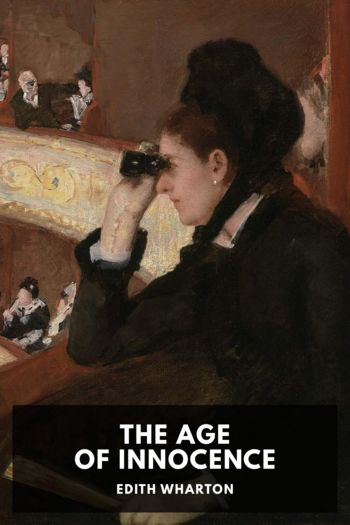The House of Mirth, Edith Wharton [series like harry potter txt] 📗

- Author: Edith Wharton
Book online «The House of Mirth, Edith Wharton [series like harry potter txt] 📗». Author Edith Wharton
Mrs. Peniston, however, did not suffer from her niece’s adaptability. Lily had no intention of taking advantage of her aunt’s good nature. She was in truth grateful for the refuge offered her: Mrs. Peniston’s opulent interior was at least not externally dingy. But dinginess is a quality which assumes all manner of disguises; and Lily soon found that it was as latent in the expensive routine of her aunt’s life as in the makeshift existence of a continental pension.
Mrs. Peniston was one of the episodical persons who form the padding of life. It was impossible to believe that she had herself ever been a focus of activities. The most vivid thing about her was the fact that her grandmother had been a Van Alstyne. This connection with the well-fed and industrious stock of early New York revealed itself in the glacial neatness of Mrs. Peniston’s drawing-room and in the excellence of her cuisine. She belonged to the class of old New Yorkers who have always lived well, dressed expensively, and done little else; and to these inherited obligations Mrs. Peniston faithfully conformed. She had always been a looker-on at life, and her mind resembled one of those little mirrors which her Dutch ancestors were accustomed to affix to their upper windows, so that from the depths of an impenetrable domesticity they might see what was happening in the street.
Mrs. Peniston was the owner of a country-place in New Jersey, but she had never lived there since her husband’s death—a remote event, which appeared to dwell in her memory chiefly as a dividing point in the personal reminiscences that formed the staple of her conversation. She was a woman who remembered dates with intensity, and could tell at a moment’s notice whether the drawing-room curtains had been renewed before or after Mr. Peniston’s last illness.
Mrs. Peniston thought the country lonely and trees damp, and cherished a vague fear of meeting a bull. To guard against such contingencies she frequented the more populous watering-places, where she installed herself impersonally in a hired house and looked on at life through the matting screen of her verandah. In the care of such a guardian, it soon became clear to Lily that she was to enjoy only the material advantages of good food and expensive clothing; and, though far from underrating these, she would gladly have exchanged them for what Mrs. Bart had taught her to regard as opportunities. She sighed to think what her mother’s fierce energies would have accomplished, had they been coupled with Mrs. Peniston’s resources. Lily had abundant energy of her own, but it was restricted by the necessity of adapting herself to her aunt’s habits. She saw that at all costs she must keep Mrs. Peniston’s favour till, as Mrs. Bart would have phrased it, she could stand on her own legs. Lily had no mind for the vagabond life of the poor relation, and to adapt herself to Mrs. Peniston she had, to some degree, to assume that lady’s passive attitude. She had fancied at first that it would be easy to draw her aunt into the whirl of her own activities, but there was a static force in Mrs. Peniston against which her niece’s efforts spent themselves in vain. To attempt to bring her into active relation with life was like tugging at a piece of furniture which has been screwed to the floor. She did not, indeed, expect Lily to remain equally immovable: she had all the American guardian’s indulgence for the volatility of youth. She had indulgence also for certain other habits of her niece’s. It seemed to her natural that Lily should spend all her money on dress, and she supplemented the girl’s scanty income by occasional “handsome presents” meant to be applied to the same purpose. Lily, who was intensely practical, would have preferred a fixed allowance; but Mrs. Peniston liked the periodical recurrence of gratitude evoked by unexpected cheques, and was perhaps shrewd enough to perceive that such a method of giving kept alive in her niece a salutary sense of dependence.
Beyond this, Mrs. Peniston had not felt called upon to do anything for her charge: she had simply stood aside and let her take the field. Lily had taken it, at first with the confidence of assured possessorship, then with gradually narrowing demands, till now she found herself actually struggling for a foothold on the broad space which had once seemed her own for the asking. How it happened she did not yet know. Sometimes she thought it was because Mrs. Peniston had been too passive, and again she feared it was because she herself had not been passive enough. Had she shown an undue eagerness for victory? Had she lacked patience, pliancy and dissimulation? Whether she charged herself with these faults or absolved herself from them, made no difference in the sum-total of her failure. Younger and plainer girls had been married off by dozens, and she was nine-and-twenty, and still Miss Bart.
She was beginning to have fits of angry rebellion against fate, when she longed to drop out of the race and make an independent life for herself. But what manner of life would it be? She had barely enough money to pay her dressmakers’ bills and her gambling debts; and none of the desultory interests which she dignified with the name of tastes was pronounced enough to enable her to live contentedly in obscurity. Ah, no—she was too intelligent not to be honest with herself. She knew that she hated dinginess as much as her mother had hated it, and to her last breath she meant to fight against it, dragging herself up again and again above its flood till





Comments (0)